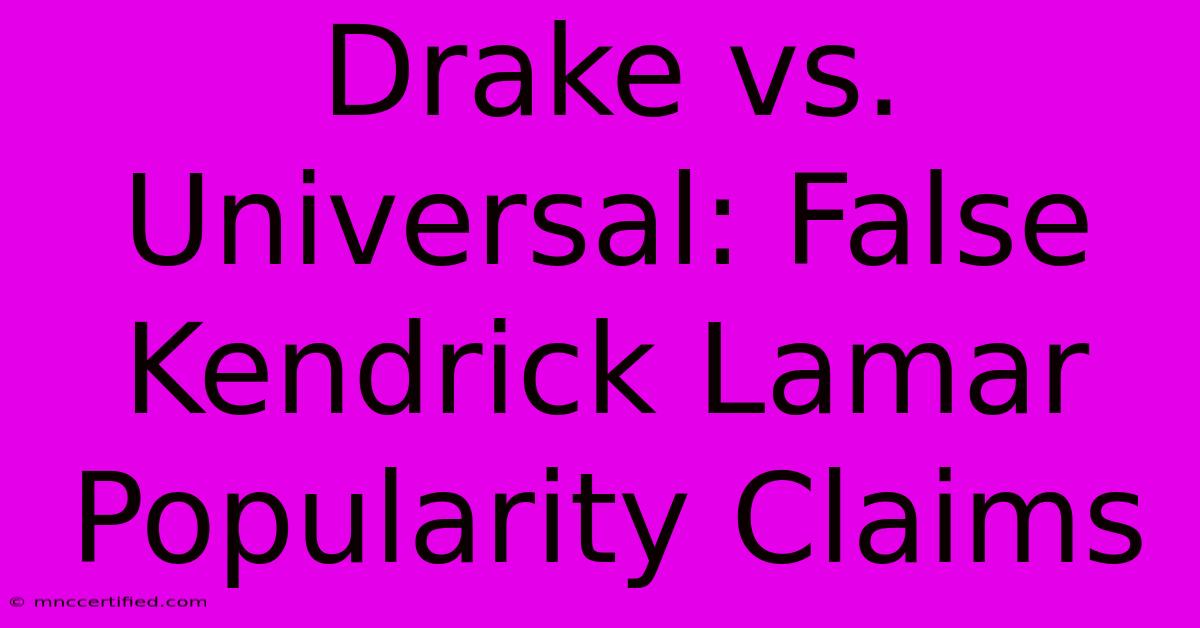Drake Vs. Universal: False Kendrick Lamar Popularity Claims

Table of Contents
Drake vs. Universal: Debunking the False Kendrick Lamar Popularity Claims
The ongoing tension between Drake and Universal Music Group (UMG) has recently taken a curious turn, with allegations swirling around inflated streaming numbers and manufactured popularity, particularly concerning Kendrick Lamar. This article delves into these claims, separating fact from fiction and exploring the implications for the music industry.
The Allegations: Inflated Streams and Manufactured Success?
Recent reports suggest Drake and others have accused Universal Music Group of manipulating streaming numbers to artificially inflate the popularity of certain artists, with Kendrick Lamar allegedly being one prominent example. While specific figures haven't been publicly released due to confidentiality agreements and legal complexities, the core accusation revolves around the idea that UMG employed questionable tactics to boost chart positions and overall streaming metrics. These tactics, if true, could range from botted streams to manipulative playlist placements.
The argument centers around the perceived disparity between Kendrick Lamar's reported streaming numbers and his actual cultural impact. While undeniably a highly successful and influential artist, some argue his official streaming metrics seem disproportionately high compared to tangible evidence of his fanbase's engagement. This discrepancy fuels speculation about potential manipulation.
The Drake-Universal Conflict: A Wider Context
This isn't an isolated incident. Drake's well-documented disputes with UMG are a long-running saga, often focusing on issues of artist rights, royalties, and control over his music. These accusations regarding stream manipulation add another layer to this complex relationship, raising important questions about transparency and fairness within the music industry. It highlights the inherent power imbalance between major labels and artists, particularly those with significant leverage like Drake.
Analyzing the Evidence (or Lack Thereof)
Unfortunately, concrete evidence supporting these claims remains scarce. Much of the discussion is based on anecdotal observations and speculation within industry circles. The lack of transparency from both UMG and Drake’s camp further complicates the situation. Without access to internal data and verifiable figures, it's difficult to definitively assess the veracity of these allegations.
The Challenges of Proving Stream Manipulation
Proving stream manipulation is notoriously difficult. Sophisticated techniques are employed to mask fraudulent activity, making it challenging to identify and quantify. Furthermore, accessing the necessary data to conduct a thorough investigation requires cooperation from UMG, which is unlikely given the sensitive nature of the accusations.
The Implications for the Music Industry
Regardless of the truth behind these specific accusations against UMG, the very existence of such allegations raises serious concerns about the integrity of music charts and streaming data. The perception of manipulation undermines the credibility of the industry and potentially devalues the hard work of genuine artists.
This controversy underscores the need for greater transparency and accountability within the music industry. Stronger regulations and independent audits of streaming platforms could help prevent future manipulations and restore trust in the system.
The Future of Artist-Label Relationships
The Drake-Universal conflict serves as a stark reminder of the ongoing power struggle between artists and major labels. This dispute highlights the need for fairer contracts, greater artist control over their music, and a more equitable distribution of revenue. The future of artist-label relationships hinges on addressing these fundamental issues.
Conclusion: Speculation and the Need for Transparency
While the claims of inflated streaming numbers for Kendrick Lamar, fueled by the Drake-Universal conflict, remain largely unproven, they serve as a potent symbol of wider industry issues. The lack of transparency and the potential for manipulation raise serious questions about the integrity of the music industry's metrics and the fairness of its power dynamics. Until greater transparency is achieved, suspicion will continue to linger, impacting the trust between artists, labels, and fans. The need for independent oversight and regulatory reform becomes increasingly urgent in light of these ongoing controversies.

Thank you for visiting our website wich cover about Drake Vs. Universal: False Kendrick Lamar Popularity Claims. We hope the information provided has been useful to you. Feel free to contact us if you have any questions or need further assistance. See you next time and dont miss to bookmark.
Featured Posts
-
Insurance Cover Deviated Septum
Nov 26, 2024
-
Farm Bureau Insurance Athens Tx
Nov 26, 2024
-
Mc Conkey Active Week 12 Fantasy Tips
Nov 26, 2024
-
Frontier Home Insurance Reviews
Nov 26, 2024
-
Credit Life Insurance Age Limit
Nov 26, 2024